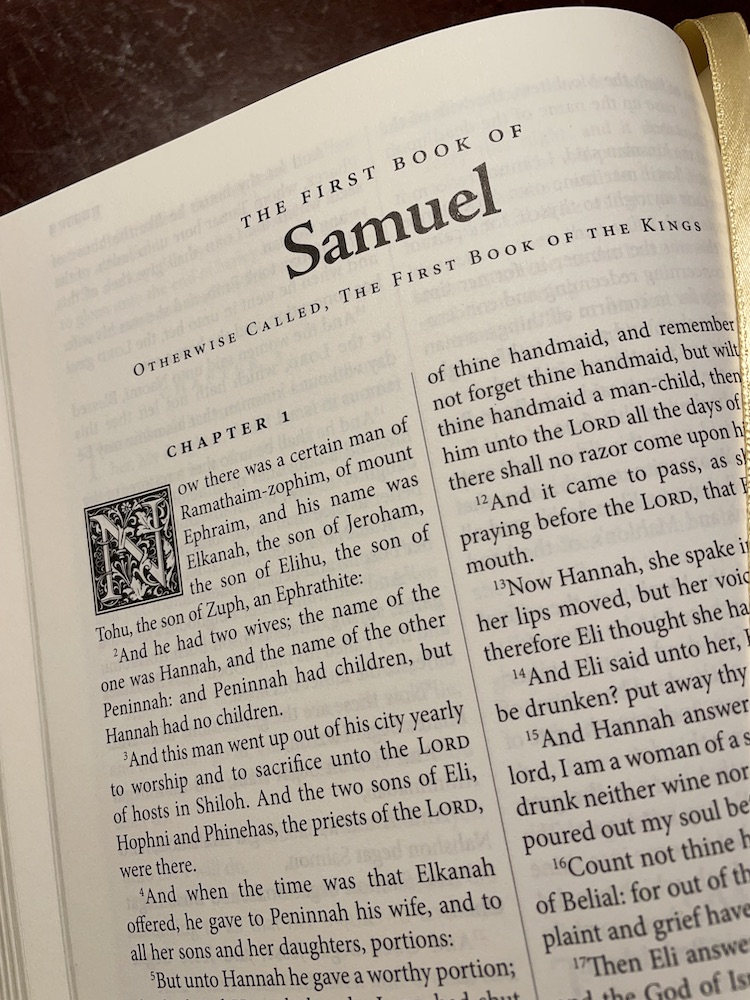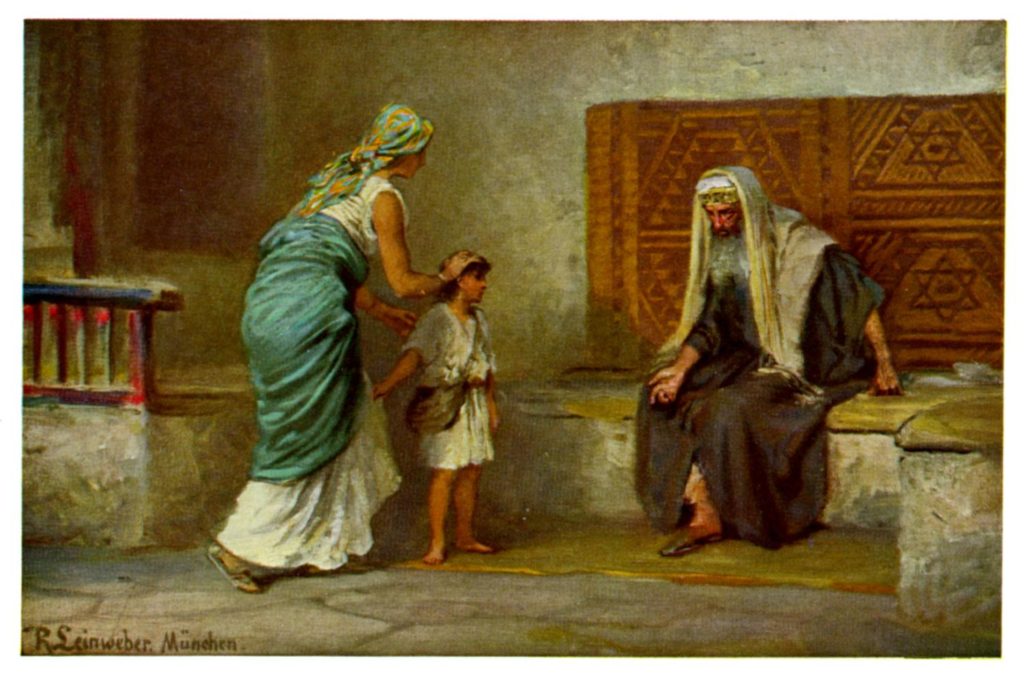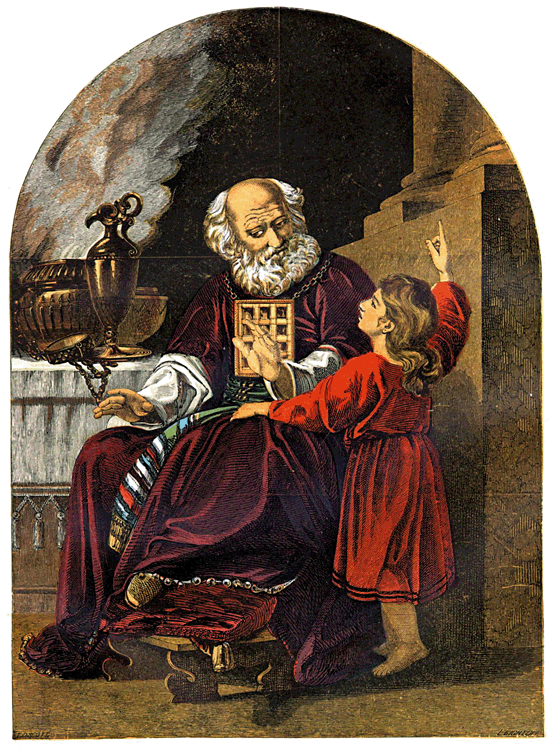
1 Samuel 21
1 Samuel 21:6, Showbread.David likely had not eaten food for the better part of four days (three days hiding from Saul in the wilderness and the fourth day fleeing to Nob, 1 Sam 20:19 cp. 1 Sam 21:1), and so he was famished. Yeshua makes reference to this incident in Matthew 12:3 when justifying his picking grain and eating it on the Sabbath. Harvesting grain on the Sabbath is forbidden in the Torah, even as eating of the showbread was forbidden for anyone other than the priests (Exod 25:30; Lev 24:5–9). Yet, Yeshua demonstrated that, even as the Torah allows an ox to be pulled out of a ditch on the Sabbath to save the ox’s life, so it was allowable for him to “harvest” grain on the Sabbath to stave off hunger, even as David ate the showbread when he was famished. (See note at Matthew 12:1–14 for a full discussion of this subject.)
1 Samuel 24
1 Samuel 24:4, Corner of Saul’s robe. Corner in Hebrew is kanaph meaning “wing, extremity, edge, border, corner of a garment.” The kanaph was the same part of a garment to which YHVH instructed the children of Israel to attache the tzitzit or blue tassel (Num 15:37–41). Thus, in can be deduced that if Saul were Torah-obedient, then a tzitzit would have been attached to the corner of Saul’s garment. This tzitzit that David cut off was symbolic of Saul’s covenantal relationship and devotion to YHVH.

1 Samuel 24:6, 10, YHVH’s anointed. Interestingly, David was also YHVH’s anointed—as much so as Saul. However, Saul occupied the throne at the time, and David didn’t, so he respected Saul’s position until such time as YHVH removed him from the kingship. David wasn’t one to presume, rush things or to usurp any authority not given him. He was patient to wait for YHVH’s timing, including the time when the throne would his according to Samuel’s prophecy.
1 Samuel 24:16–21 (also 26:25), You are more righteous than I. Here King Saul prophesies that David will succeed him as king over Israel, and that he will do go great things and prevail. There were other instances of Saul coming under a spirit of prophecy (e.g., 1 Sam 10:10–11; 19:23–24). Saul was capable of hearing the voice of Elohim, but because of unrestrained carnality, a spirit of rebellion (15:23), and his inability to submit to the will of Elohim, he was spiritually conflicted. Clearly, YHVH was not in his heart (1 Sam 15:15, 21, 30). Within him was a constant struggle between doing the will of Elohim and his own will. The latter usually won out, because he had not unconditionally surrendered his will to YHVH (15:23, 26). Saul was swayed more by popular opinion than by the Word of Elohim (1 Sam 1 Sam 15:24, 30). Saul was able to worship Elohim (15:31), but was spiritually weak and not able to obey the Word of Elohim (15:23, 26). It is impossible to love and worship Elohim without obeying his Word. Let’s be honest. Most of us are at least a little if not a lot like Saul in these areas.
Yeshua declared that those who love him will obey his commandments or his Word (John 14:15). James wrote that the demons even tremble before Elohim (Jas 2:19), even though they are in rebellion against the Word of Elohim. Faith, works and obedience must accompany the worship and fear of Elohim (Jas 2:14–26). Though Saul paid lip service to YHVH, his heart was far from him. He obeyed when it was convenient and expedient to him. Isaiah similarly spoke of the rebellious Israelites who drew near to YHVH with their lips, but in reality, their hearts were far from him (Isa 29:13). Yeshua quoted and applied this verse to the hypocritical and rebellious religious leaders of his day (Matt 15:6–7).
In a certain sense, Saul is spiritual type of Christianity, which teaches and obeys the Torah-Word of Elohim only in part, and otherwise follows their own anti-Torah belief systems.
1 Samuel 25
1 Samuel 25:1, Samuel died. Samuel was able to die in peace, since his ultimate mission was now complete. David’s kingship was safe, since Saul had just ceased pursuing David and admitted that David would be king.
1 Samuel 27
1 Samuel 27:3, So David dwelt with Achish. Why would the Philistines now accept David into their midst after he had fought against and killed so many of them as a general in Saul’s army? They accepted David because he was now an enemy of Saul. It was a political move on their part. This is a classic case example of the saying, the enemy of my enemy is my friend.
1 Samuel 28
1 Samuel 28:15, 19 Samuel. Was this actually Samuel, and does this scripture passage prove that Samuel’s soul was immortal, as many in the mainstream Christian church teach, thus proving the doctrine of the immortality of the soul?
In this passage of Scripture, the witch of Endor is acting as a spiritist or medium—a necromancer. A demon is speaking and is posing as the dead Samuel. Yes, this demon looked and sounded like Samuel, but it wasn’t. Even though Scripture calls this demonic impersonator Samuel, this was written from the human perspective, as many Scriptures are, since the Bible is often quoting humans who are speaking and writing from their own perspective based on their limited knowledge, and not necessarily stating truth in the full sense of the word. This is where the astute and Spirit-led Bible student will rightly divide the Word of Elohim, so that they don’t make it say things that are contrary to spiritual truth or contradict other scriptural truths. Moreover, do you not think that the sovereign, all powerful Elohim can’t use anyone or anything to communicate to anyone in any way he chooses—in this case to King Saul? After all, he used a donkey to speak to Balaam. Yeshua said that Elohim could raise up rocks to praise him. Elohim used lying spirits to prophesy lies to King Ahab through the mouths of his false prophets (1 Kgs 22:19–23). Know ye not that even Satan can transform himself transforms himself into an angel of light. (2 Cor 11:14)?
In verse 19, the demon posing as Samuel declares that Saul and his sons will be with him. If one believes this is Samuel speaking, and believes that the soul is immortal and goes to heaven when a saint dies, then it would be logical to assume that Saul and his sons would be going to heaven. However, if this is a demon speaking, where is he speaking from? Yes, the demon is saying that Saul and his sons will be with the him wherever he happens to be—probably in what the Bible refers in several place to as the pit, abyss or, in the Greek, tartaroos (2 Pet 2:4)—the place where the demons are being held in prison awaiting the final judgment.
1 Samuel 28:24, Calf in the house. In ancient times, in the average Israelite home, animals lived in the house with the people.
1 Samuel 29
1 Samuel 29:6, As YHVH lives. Here Achish the Philistine is invoking the name of YHVH. Why would a heathen whose people worship Dagon (the wheat harvest or fish god of fertility)call on the name of YHVH, the Deity of the Hebrews? Ancient history shows that the people of Canaan in biblical times worshipped a pantheon of deities including Ba’al, Asherahm, Berith, Chemosh, Dagon, El, Elyon, Moloch, YHVH and many others, whereas the Israelites worshipped only YHVH Elohim. The biblical record reveals that at one time, the inhabitants of the earth knew the name of YHVH, and called on him (Gen 4:26). This doesn’t mean, however, that they remained faithful to the truth he had revealed to them through his servants (e.g., Adam, Enoch, Noah, or Shem) even though the use of the name YHVH continued. In our day, the use of the names God, Jesus, Christ can mean many things to different people, and their use may have little or no relevance to what the Scriptures reveal about the Godhead or what he requires in the way of obedience.






